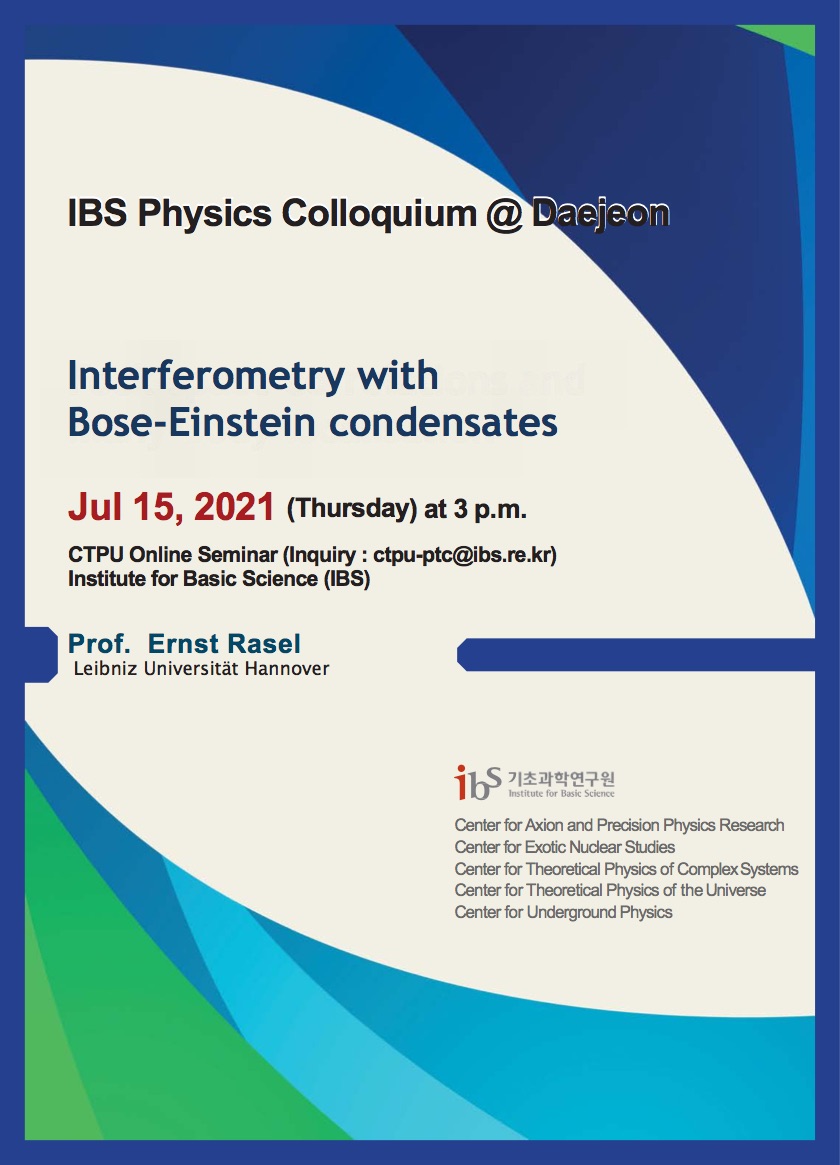Activities

-
interferometry with bose-einstein condensates
Ernst Maria Rasel
Leibniz University, Germany
15 July 2021 Thu 3 pm






IBS Center for Theoretical Physics of Complex Systems (PCS), Administrative Office (B349), Theory Wing, 3rd floor
Expo-ro 55, Yuseong-gu, Daejeon, South Korea, 34126 Tel: +82-42-878-8633
Bose-Einstein condensation offers exciting perspectives for high-precision-and-accuracy atom interferometry employed for both terrestrial and space-borne inertial sensing and fundamental- physics experiments.
With respect to laser-cooled atom sources, Bose-Einstein condensates allow for better control of their motional degrees of freedom as well as for novel types of interferometers. They can be very efficiently, reliably and robust generated exploiting atom chip allowing for in-field sensing as well as space-borne operation. Most importantly, their low expansion corresponding to few tens of Pikokelvins brings in reach a reduction of important systematic errors as well as higher precision by extending the free-fall time of the condensate in the interferometer.
Apart from observing Earth gravity, atom interferometers may serve to explore the nature of gravitation, general relativistic effects as well as dark matter and energy.
We acknowledge financial support by the Deutsche Forschungsgemeinschaft (DFG, German research foundation) in the project A01 of the SFB 1128 geo-Q as well as of the SFB 1464 and under Germany’s Excellence Strategy - EXC 2123 QuantumFrontiers - 390837967 and from ”Niedersächsisches Vorab” through Förderung von Wissenschaft und Technik in Forschung und Lehre” for the initial funding of research in the new DLR-SI Institute.
The QUANTUS experiments and MAIUS missions build on the cooperation between the groups of C. Lämmerzahl (Univ. Bremen), A. Peters (Humboldt Univ. Berlin/Ferdinand Braun Institut), T. Hänsch/J.Reichel (MPQ/ENS), K. Sengstock/P. Windpassinger (Univ. Hamburg/Univ. Mainz), R. Walser (TU Darmstadt), and W.P. Schleich (Univ. Ulm) and the Leibniz University Hannover.
This project is supported by the German Space Agency Deutsches Zentrum für Luft- und Raumfahrt (DLR) with funds provided by the Federal Ministry of Economics and Technology (BMWI) under grant number DLR 50WM1552-1557 and the Cluster of Excellence QuantumFrontiers










